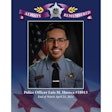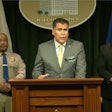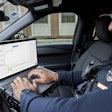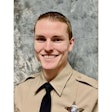Editor's Note: This is a first-person account. The City of Miami officers quoted here are speaking anonymously, as they are under a gag order from their department, pending internal investigations into allegations of police misconduct.
The projectile whizzed towards me through the smoke, bounced on the asphalt just in front of my left foot, and careened upward, striking me in my upper thigh. My big plastic shield, blaring POLICE on the front, had been circumvented by a lucky shot.
I winced, and resolved that tomorrow I would scoot over to Sports Authority and buy a cup. Had that one bounced a little higher, I would have been doing more than wincing. There was little time to think about that, though, as another silver-colored sphere came rocketing through the haze at me, as if from a desperate quarterback on third down. It slammed into the top of my shield and bounced away back toward our attackers. Then, one of the "protestors" who had just moments ago shoved me and my partner, trying to break through our line, blew a whistle and held up his hands.
"OK, take a break everybody; get some water."
This was the last of our training sessions for the Free Trade Area of the Americas (FTAA) demonstrations, which would be coming up in less than a month. Our department, Miami-Dade, was going to commit almost one-third of its entire sworn force of about 1,100 officers to this effort to supplement the City of Miami Police. There would also be help from the Florida Highway Patrol and a few other small departments.
This was our "dress rehearsal," held downtown in the streets that were most likely to be the scene of some action. We had already been through two other similar exercises, in which officers from our Training Bureau and our tactical teams played the roles of protestors and anarchists. They played them well. We were winded, sore, and more than a few of us on the front line, yours truly included, had bloodied knuckles at night's end.
The training committee created smoke on the street for the last two of our simulations and were hurling baseballs wrapped in duct tape to simulate rocks and bottles. At this session, they even threw some trash cans at us. The "simulation" was so real that more than a couple of real fights broke out, and the training coordinators had to step in and separate people, reminding us that this was only a drill.
"F___ 'em," my Lieutenant snarled while our sweat-soaked team took a water break. "If they want us to play, we play for keeps. If someone kicks you, you chop 'em," he said, swinging his arm down as if it were carrying a PR-24. "Don't take any s___." We didn't. Our Mobile Arrest Platoon or "MAP-1" team had a strong spirit of camaraderie during the training, which was the most rigorous of any training I have experienced in my 24 years of police work.
By the time the real FTAA meetings got under way we felt more than ready. Carting duffle bags full of our newly issued gear, we loaded up into vans and headed to our staging area, at the Freedom tower.
Caught in the Middle
The Freedom tower is one of Miami's historic buildings, under interior renovations. It was completely gutted, so we had the 13 stories to ourselves. The vast, empty lobby on the first floor was our "living room," where we camped while we awaited deployment instructions.
Strategically this was a good spot: right across the street from the American Airlines Arena where the FTAA meetings were being held. The Arena sits at the entrance to the Port of Miami, one of the busiest and most lucrative seaports in North America, and the brass in charge of planning our operations decided that the Port, above all other potential targets of terrorists and anarchists, was the most critical and needed the most impenetrable defense.
A field force of about 50 officers was posted on the north side of the Port, and another was just south of it, in front of the Bayside Shops, a fashionable tourist spot. Just south of Bayside was Bayfront Park, where a rally of some 30,000 to 40,000 Teamsters was to be held on Thursday. We were caught in the middle between the Park and the Port. And that's where the brass wanted us. We were designated to be "mobile" and were supposed to hop on buses and hurry to scenes within our given sector to make arrests when necessary.
The legitimate union protestors, previous World Trade Organization (WTO) and FTAA demonstrations had taught us, were not going to be the problem. What our commanders were concerned about were anarchists from sects like the "Black Bloc," who materialize at these functions for the sole purpose of causing damage and attacking police. Our Intel told us the Bloc was going to try to storm the Arena grounds and set fires while blocking the traffic routes in and out of the Port.
Waiting Games
Tuesday morning Nov. 18 was our first morning on duty, and we each found a spot in the Freedom Tower's empty first floor. Sleeping bags, camping cots, lawn chairs, magazines, chess, dominoes, and poker-even a couple of TVs and an Xbox-helped us kill the hours in between deployment. We also brought our own snacks to supplement the once-a-day shipment of soggy croissant sandwiches, chips, granola bars, and fruit that was delivered to us.
I was long past wondering how they picked me-a 45-year-old Homicide Detective-and other even grayer colleagues, to be on the front line of a crowd control arrest team. We were here though, and we were ready.
Heaven knows we had the equipment. It took almost 10 full minutes to get from skivvies to full gear, including CamelBak and radio earpiece. Dressing for "work" started with BDU pants, then a long-sleeved pullover, then body armor, Hatch vest, Hatch leg protectors, arm protectors, gloves, and helmet. Once I was done I looked like a cross between an NFL linebacker and a ninja turtle, and pretty much no air found its way to my skin. That may not sound so bad for November up North some place, but this is Miami. Our November weather is hot and humid, and all that gear was miserable. Needless to say, our water and Gatorade supplies were never taken for granted.
The first day was quiet, but it set the stage for much of what we would be doing the rest of the week: getting the word to get all our gear on, and be ready to move. Then-you guessed it-sit, and wait. "Hatch up!" was the battle cry, and we would all put down our cards, books, and magazines (and in some cases, wake up from our naps) to start layering on the gear.
Cat and Mouse
Wednesday at "Camp Freedom" brought numerous reports of anarchist groups gathering and getting ready to do damage or knock down fences. We spent much of the day getting on the bus, sitting, going to various street corners, and chasing the would-be vandals off into their holes.
The cat-and-mouse game was all ours from the start, as we had observers on the roof of the Arena and the Freedom Tower spotting the hoodlums as soon as they would get together and start collecting their rocks and bottles. In addition, one of two choppers was in the air almost constantly. So there was virtually no place for the anarchists to muster without being spotted. One group of about five got cornered by a field force just as we spilled out of our bus, blocking their route of escape. They stood with hands high in the air, one female holding up peace signs to the officers detaining her. They were let go a few minutes later.
It was a relatively quiet night, and I'll let one of the bad guys tell you why. "There was way too many cops," a self-proclaimed anarchist was quoted as saying in the Miami Herald after it was over. "We figured it wasn't worth it."
Hatch Up!
We did have quite a presence, and at no time was that more evident than on Thursday, when most of the activity was expected. We had been keeping long hours, working about 5 a.m. to 10 p.m. every day, and most of us lived far from the city itself, so we were getting about two to three hours of sleep a night.
Thursday was even worse. Thursday morning we went on duty an hour earlier, at 4 a.m., so that we could be there if needed early. We got our first "Hatch up!" order at about 6 a.m., and pretty much stayed on hold for a couple of hours before being told we could dress down.
At about 10 a.m. we got called again, and this time we went into action down to the front lines, three blocks away, for the big Teamsters rally and march. The anarchists were sprinkled in among a much larger, peaceful crowd, but it was a very orderly demonstration that went on for a couple of hours.
Our show of force was formidable. We were positioned just north of the demonstrations, and there must have been four field forces and our MAP team there. It was an entire city block solid of nothing but Miami-Dade cops. After the rally and march, the Teamsters dissipated, many of them coming up and thanking us for being there (though you'll never read that in the local newspapers) and even passing out fruit and water to us.
But as the street cleared, 10 or 15 scruffy, long-haired youngsters remained, taking pictures of us, writing notes, talking on cell phones, while we remained in formation. Several of them walked by making silly taunts to test the water but, if they were looking to inflame one or more of us, they got no takers.
Double Time
After an hour or so of holding the line after the demonstrations, we were advised to turn and head back to the Freedom Tower. Exhausted and sleep deprived, we went back, peeled off the sweaty gear, and went back into R&R mode.
I lay down on my inflatable camping mat and went instantly to sleep, but my slumber lasted all of 10 minutes. Someone tapped my foot, and said, "Get your gear on, we're going out."
As soon as we got suited up and went out the front door, our lieutenant and sergeant started trotting, and yelling, "Double time! Let's go!"
I'm sure I wasn't the only one whose brain almost short-circuited. What? Run, in this stuff? But run we did, for three blocks, towards a thin column of smoke rising from the middle of Biscayne Boulevard, right where the demonstrations had been earlier in the day.
It wasn't until about five minutes later, when my breathing had slowed down, that my body started to feel the fatigue. The lack of sleep, the standing, and now the three-block dash in full riot gear was taking its toll.
I looked down the line, and saw the face shields of my brother and sister officers fogging up, and I knew they were feeling it too. We were tired and hurting, but we were primed, too. There was no doubt in anyone's mind that we were ready to take care of business. All eyes were then focused on the group of troublemakers about 50 yards to our south.
To the south of the rioters was a much smaller contingent of black-clad City of Miami police officers in their full riot gear. The rag-tag bunch of thugs trying to stir up a fight were hurling rocks and garbage in their direction, but they clearly were not interested in coming our way, and pressed closer to the city guys, who had also formed to the east, forming the base and one side of a big "U."
We were on the opposite side of that U, and it wasn't long before we heard some PepperBall rounds go off, followed by shouting. A few rioters hit the deck. Then the city cops' eastern line swept forward, and the group of anarchists, which looked to be no more than 80 to 100 in strength, turned tail and ran full tilt to the west, the open end of the "U."
Rocks and Paint
It was over about as fast as it began.
"They were throwing paint and rocks, and other crap at us," one City of Miami officer said. "But as soon as we showed them we weren't taking any s___ from them, they hauled ass out of here."
The city cops arrested a few of the rioters at the scene, and then a few down the road who refused to disperse. A couple of brief skirmishes at various street corners, between city cops and slow learners, resulted in a few more arrests.
"Somebody threw something that splashed near me, and it smelled pretty bad, like p___ maybe," another city officer told me. "Another couple of them were in the bushes, crouching down and gathering rocks in a cardboard box, but we arrested them before they had a chance to throw them." Not much more happened the rest of the day or night.
The next day, outside the Dade County Jail, the same bunch gathered outside and were allowed to march around the block to protest the arrests. Once they reached an area that they were told was restricted (because it was so close to the State Attorney's Office building), they were told to turn around and leave. They didn't, and so there was another brief confrontation, mostly with one of our Miami-Dade Field Forces. Several more rabble rousers were sent to jail, which this time was conveniently right across the street.
All in all, the savage attacks that the Black Bloc promised never came close to fruition. I kept looking for the one guy I had seen interviewed on national TV a couple of days earlier. He was missing a tooth and had rings all over his face, and he said, "We're gonna come down there and take over."
I don't think a protestor even got closer than two blocks to the Arena, and the most damage the city suffered was one broken store window and some paint on an officer's uniform.
Mopping Up
After the FTAA, the Miami Herald raked the police over the coals, jumping on the post-event bandwagon that the "activists" had started about brutality, police state, all the other tired stuff that Seattle, Quebec City, and the other trade meeting venues have already been forced to handle. In fact, they are still covering what is now a Citizens Review Panel investigation into police harassment and brutality claims by various characters who look like they've definitely done this before, in other cities.
But overall, the operation was a windfall success. Our city was intact at convention's end, and we only had a small number of officers treated for minor injuries. We learned from the other cities, and I think the city officials will gladly brave a few brutality complaints (which they would have gotten anyway) rather than have to clean up millions of dollars in damage, patch up dozens of wounded police officers, and then have to listen to people saying that they didn't do enough to stop the violence.
As a native South Floridian, I can truly say I was proud, not just as a police officer, but as a citizen, to have a part in keeping my home from being defaced by a bunch of violent thugs. In 24 years of police work here in this community, I've had my fill of riots and violence, but I'll gladly put on the cumbersome gear and do it again if the threat returns.
After all, it's what the job is all about.












